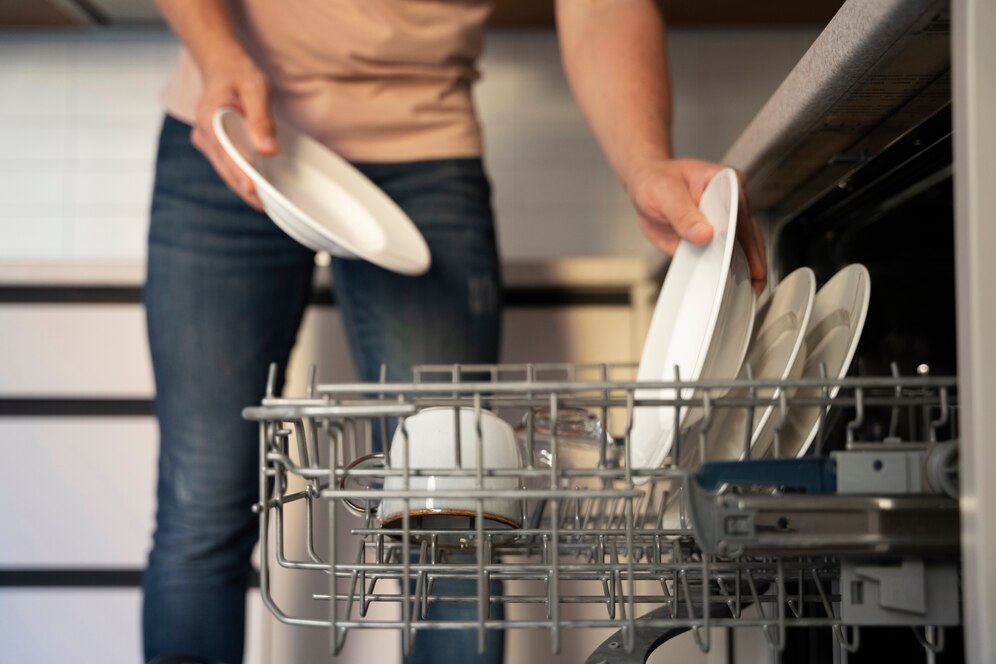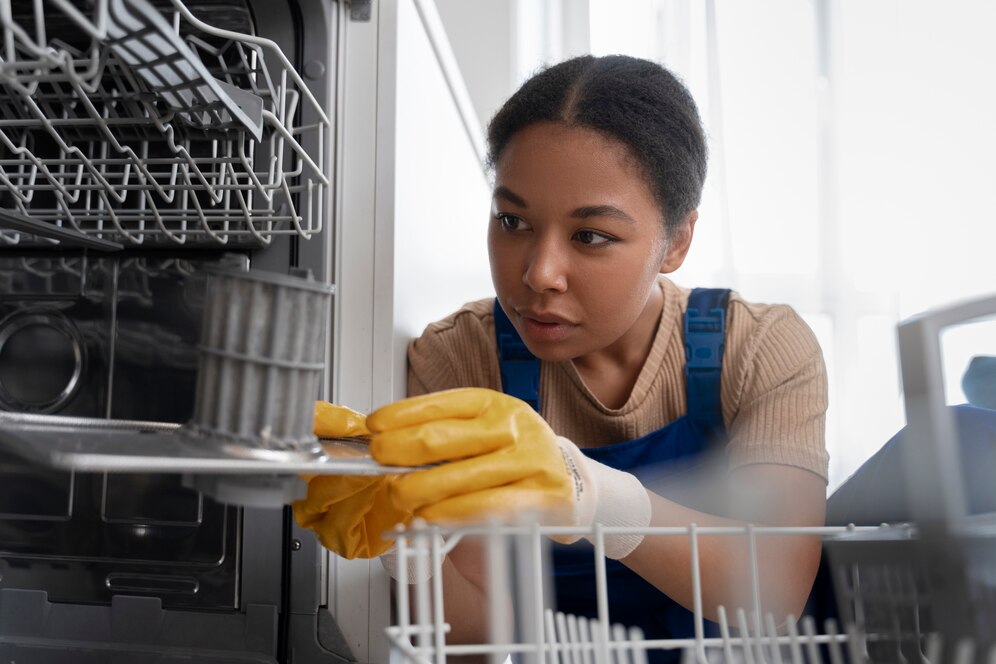A Comprehensive Guide to Dishwasher Maintenance for Optimal Performance
 A dishwasher is a modern convenience that many of us cannot imagine living without. However, like any appliance, it requires regular care and maintenance to keep it running at its best.
A dishwasher is a modern convenience that many of us cannot imagine living without. However, like any appliance, it requires regular care and maintenance to keep it running at its best.
In this guide, we’ll explore the signs that your dishwasher may need maintenance, provide DIY maintenance tips you can try at home, and review frequently asked questions about dishwashers. This guide, combined with the help of a professional dishwasher repair service when needed, will ensure your dishwasher remains efficient, effective, and long-lasting for years to come.
Summary:
- Importance of Dishwasher Maintenance
- Signs That Your Dishwasher Needs Maintenance
- DIY Maintenance Tips
- Using a Professional Repair Service
- Frequently Asked Questions
1. Importance of Dishwasher Maintenance
Regular maintenance of your dishwasher is crucial to ensure its optimal performance and longevity. Proper upkeep not only enhances the efficiency of your dishwasher but also prevents minor issues from escalating into major, costly repairs.
Over time, food particles, grease, and soap scum can build up, leading to clogs and unpleasant odors. Regularly cleaning your dishwasher, including the filter, seals, spray arms, and the interior will go a long way.
Additionally, checking and replacing worn-out parts like racks and hoses can protect against leaks and damage. Routine maintenance also helps with better dishwashing results, offering sparkling clean dishes every time!
2. Signs That Your Dishwasher Needs Maintenance
Understanding the signs that your dishwasher needs maintenance can help you address potential problems before they escalate into something much larger.
- Dishes come out dirty. One of the most common indicators is poor cleaning performance. If your dishes come out still dirty or spotted, it could be a sign of a clogged spray arm or a malfunctioning detergent dispenser.
- It’s making noises. Another sign is strange noises. While dishwashers aren’t silent, a sudden increase in noise level or grinding sounds could indicate a problem with the motor or pump.
- Your appliance smells. Unpleasant odors persisting after a wash cycle may suggest a build-up of food debris or a blocked filter that leads to a smelly dishwasher.
- It’s not draining properly. If you notice water leakage around the dishwasher or pooling at the bottom, it could point toward a faulty door seal or a drain issue.
- Dishes are not drying. There are a few reasons that could be why your dishes are not drying. A common culprit is an issue with the heating element. The issue could also be that your dishwasher’s rinse aid dispenser needs to be filled, the thermostat is broken or perhaps it’s a simple manual error by loading dishes incorrectly. A professional will be able to identify the problem.
While some of these problems can be fixed with simple DIY solutions listed below, others may require the expertise of an appliance or dishwasher repair service.
3. DIY Maintenance Tips
DIY maintenance for small issues can go a long way in keeping your dishwasher running efficiently.
- Regular cleaning is key. Make it a habit to clean the interior of your dishwasher at least once a month using a dishwasher-safe cleaner. This helps to get rid of any build-up of food debris or grease that might affect performance.
- Inspect and clean the spinning arms. Clogged holes can prevent water from reaching all dishes. Use a toothpick or thin wire to clear out any obstructions.
- Check and clean the filter. Doing this frequently will help you avoid unpleasant odors and poor cleaning results.
- Look closely at the door seal. Don’t forget to clean and check the door seal for any signs of wear and tear. A faulty seal can lead to water leaks.
These simple DIY tips can help in maintaining your dishwasher’s performance and prolong its lifespan.
4. Using Professional Repair Services
While there are many DIY tutorials and videos available for minor dishwasher repair, it can be best to leave larger or ongoing issues to the professionals. For those in the St. Louis or Kansas City area, Diamond Factory Service offers top-quality St. Louis dishwasher repair. Our team of certified technicians is well-equipped to handle any dishwasher issue efficiently and effectively. Give us a call today and schedule your next maintenance service with Diamond Factory Service.
5. Frequently Asked Questions
 Q1: How often should I clean my dishwasher?
Q1: How often should I clean my dishwasher?
A: Ideally this should be done once a month. This helps in maintaining optimal performance and extending the lifespan of your appliance.
Q2: What can I use to clean my dishwasher?
A: You can use a variety of household items to clean your dishwasher. A mixture of vinegar and baking soda works well for removing hard water stains and buildup. For stubborn stains, a commercial dishwasher cleaner can be used.
Q3: What type of detergent is best for my dishwasher?
A: The choice of detergent can depend on your dishwasher model. However, most manufacturers recommend using tablets or pods as they contain the right amount of detergent.
Q4: Is it important to rinse dishes before putting them in the dishwasher?
A: While it’s recommended to scrape off large food particles, pre-rinsing dishes isn’t necessary. Modern dishwashers are designed to handle minor food residues.
Q5: Why are my dishes not coming out clean?
A: There could be multiple reasons for this, such as improper loading, low water temperature, using the wrong detergent, or a clogged spray arm. Regular maintenance and a professional can help identify and solve these issues.
Q6: What should I do if my dishwasher starts making unusual noises?
A: Unusual noises could be due to a variety of issues like a faulty motor, pump, or spray arm. If regular maintenance doesn’t resolve the noise, you should consider calling a professional appliance repair company to diagnose the problem.
Q7: How can I prevent my dishwasher from smelling bad?
A: Regular cleaning and maintenance is the key to preventing bad odors. Also, ensure to scrape off food residues from your dishes before loading them into the dishwasher, and keep the filter clean.
Q8: What should I do if my dishwasher is leaking water?
A: Leaks could be due to a damaged door seal, overloading, or using the wrong detergent. If the issue persists after addressing these potential causes, it’s advisable to contact a professional dishwasher repair company.
Q9: My dishwasher makes a lot of noise. Is that normal?
A: While dishwashers aren’t silent appliances, excessive noise could indicate a problem. It might be due to a faulty motor, pump, or spray arm. If the noise persists after regular maintenance, consider getting it checked by a professional.
Q10: Can I fix common dishwasher problems myself?
A: While some common issues can be resolved with DIY solutions, complex problems, especially those involving electrical components or plumbing, are best handled by a professional appliance repair service to ensure safety and effectiveness.
By Jeff Russel, Owner of Diamond Factory Appliance
Jeff Russel is serving the greater St. Louis and Kansas City areas. Diamond Appliance provides efficient and effective service for all your appliance repair needs. Our knowledgeable technicians are trained to diagnose and fix any type of problem affecting major appliances quickly, reliably, and cost-effectively. We work hard to ensure customer satisfaction and their many positive reviews demonstrate the quality of our services.



